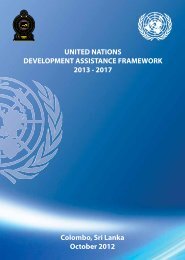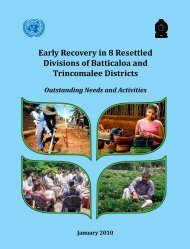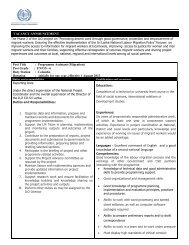Sri Lanka Human Development Report 2012.pdf
Sri Lanka Human Development Report 2012.pdf
Sri Lanka Human Development Report 2012.pdf
You also want an ePaper? Increase the reach of your titles
YUMPU automatically turns print PDFs into web optimized ePapers that Google loves.
the public sector in policy reform processes, rather than<br />
merely voicing their concerns. Both the government and<br />
the private sector could work with each other for the benefit<br />
of the country as a whole. If the government alienates<br />
the private sector, or if the private sector is unwilling to<br />
participate except on its own terms, public policy-making<br />
becomes one-sided, and democracy is shortchanged.<br />
The two are working together in <strong>Sri</strong> <strong>Lanka</strong>, though the<br />
pace is slow. The Asia Foundation has sponsored dialogues<br />
where public officials and private citizens, including small<br />
business people, traders’ associations, citizens groups and<br />
other local stakeholders, work collaboratively to address<br />
regulatory issues that affect businesses at the local level.<br />
Aimed at building a ‘culture of dialogue’, the initiative is a<br />
model of participatory local governance that could help to<br />
accelerate reforms through grass-roots pressure.<br />
Dialogues can also provide accurate diagnoses of problems<br />
affecting private investment and public service delivery. As<br />
such, they could be used as part of designing appropriate<br />
policy reforms tailored to local circumstances, and in<br />
promoting transparency by disseminating information and<br />
creating conditions for improved public scrutiny. Over the<br />
longer term, they might contribute to stimulating growth,<br />
increasing job creation and spreading the fruits of growth<br />
more equitably. But they would need to move into the<br />
mainstream of public policy-making to be fully effective.<br />
Public-private dialogues are working especially well in<br />
conflict-affected areas, where social capital and statecitizen<br />
relations need much focus. One dialogue convened<br />
in Polonnaruwa in 2010 addressed issues constraining<br />
enterprise growth in the Eastern Province and made progress<br />
towards durable solutions. Participants from Batticaloa,<br />
for instance, agreed that while the tourism potential for<br />
their district is high, local actors had very little input in<br />
tourism development plans. Through discussions, private<br />
and public sector participants worked together to develop<br />
their own strategies, taking into account local constraints,<br />
concerns and opportunities. Since then, the group has<br />
formalized a Batticaloa Town Tourism <strong>Development</strong> Plan,<br />
which is used by the Batticaloa Municipal Council in its<br />
development activities.<br />
In contrast, the absence of genuine and continual<br />
stakeholder engagement with public policy-making can<br />
lead to a breakdown in state-citizen relations. A good<br />
example was the fallout surrounding the introduction of<br />
a new national pension scheme—the Employees’ Pension<br />
Benefit Scheme—in May 2011. A spate of protests against<br />
it culminated in the death of a free trade zone worker and<br />
a severe public relations backlash for the Government.<br />
It was later learned that the bill creating the scheme<br />
was rushed through, without a robust and inclusive<br />
consultative process. The backlash was more on the way<br />
the scheme was developed, and on some key elements of<br />
the benefits, while the stakeholders in principle did not<br />
oppose the concept of the new pension scheme. The bill<br />
was withdrawn eventually, but the experience underscored<br />
the need for inclusive consultation.<br />
Despite the withdrawal of bills under political pressure,<br />
the Government could do more to strengthen consultative<br />
policy-making mechanisms. This leaves room for easy<br />
opposition by interest groups, which can force quick<br />
backtracking by the Government - a vicious cycle for which<br />
a precedent has now been set. This stalemate could be<br />
broken through the introduction of genuine and inclusive<br />
consultations, with the Government demonstrating that it<br />
has learned from previous experiences.<br />
While consultation is a hallmark of a thriving democracy,<br />
it needs to be genuine, rather than a mere formality to<br />
rubberstamp official positions. A major problem in <strong>Sri</strong><br />
<strong>Lanka</strong> is the tendency for the private sector to toe the line<br />
of every political regime to minimize ‘political risks’. This<br />
opportunism could be reduced through strategic incentives<br />
that allow the private sector to be less dependent and more<br />
competitive. Small and medium enterprises in particular<br />
need to participate in higher-level policy engagement,<br />
possibly using the private-public dialogue model to foster<br />
a bottom-up push for reform.<br />
114<br />
sri lanka <strong>Human</strong> <strong>Development</strong> report 2012






